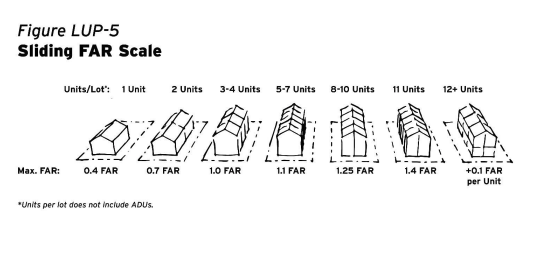We did it.
Last night, the Sacramento City Council voted unanimously to proceed with staff's proposed revisions to the 2040 General Plan that would end exclusionary zoning and allow much more infill housing near transit stops! In the words of our vice-chair Ben Raderstorf, "This will not only help solve the housing crisis now, but it helps future-proof the city against the next housing crisis, and the one after that." The beam is lit!!
The two major changes are:
1. A Missing Middle Housing policy that converts all R-1 (single family-only) zoned areas to allow a "form-based" zoning code that allows an unlimited number of units (homes) on each lot, limited instead by square footage relative to the lot size. This relationship is called "Floor Area Ratio" (see below for the policy) and allows for smaller units and more flexible building sizes. On a 6,000 sqft lot with an FAR of 1.0, one can build up to a 6,000 sqft fourplex, a 7,500 sqft sixplex, or larger if including more units!
City of Sacramento Community Development Dept.
Julie Campoli, Visualizing Density
2. A change to the proposed final draft 2040 General Plan land use map so that a Floor Area Ratio of up to 2.0 is allowed on lots within 10 minutes' walk of existing and planned high-frequency SacRT transit stops.
We could NOT have done this without the support of dozens of Sacramento community organizations and leaders including:
350 Sacramento
Alkali and Mansion Flats Historic Neighborhood Association
American Institute of Architects Central Valley (AIACV)
Assemblymember Kevin McCarty
Civic Thread
Downtown Sacramento Partnership
East Sacramento Community Association (ESCA)
Environmental Council of Sacramento (ECOS)
Midtown Association
Newton Booth Neighborhood Association (NBNA)
Oak Park Neighborhood Association (OPNA)
Sacramento Area Bicycle Advocates (SABA)
Sacramento Area Council of Governments (SACOG)
Sacramento Community Land Trust
Sacramento County Young Democrats (SCYD)
Sacramento Investment Without Displacement (SIWD)
Sacramento Housing Alliance (SHA)
Sacramento Metro Advocates for Rail and Transit (SMART)
Sacramento Metropolitan Air Quality Management District (Sac Metro Air District)
Sacramento Regional Transit (SacRT)
Strong Towns - Sacramento
United Latinos
A huge thank you to Mayor Steinberg, the entire city council, and city Community Development Department staff led by Matt Hertel and Nguyen Nguyen for their bold vision and courage in moving forward with this proposal.
And finally, THANK YOU to all of you who sent in eComments, emailed your council members, put up yard signs, and showed up last night at council to share your support. Only because of your support was this policy developed and passed.
If you can spare an extra moment, shoot your council member a thank you email. These help a lot. And if you'd like to read more about what actually passed last night, you can take a look at the staff report here including helpful maps and diagrams.
What's next? Stay tuned for the final vote to approve the entire 2040 General Plan (land use element included) on February 27, 2024.
House Sacramento supported the recommendation to end exclusionary zoning by switching from regulating by unit caps to regulating by FAR (Floor Area Ratio).
FAR is innovative — more flexible, responsive, and lot-specific growth than arbitrary unit caps.
FAR is fair — allows housing to be built equally across the city, including in wealthy, high-opportunity neighborhoods.
FAR is affordable — encourages smaller, more affordable units.
FAR is environmentally friendly — allows for more housing in our most walkable and bikeable neighborhoods.
We also support Council’s direction to raise FAR to 2.0 near transit.
Climate — studies show transit-oriented development is one of the highest-impact climate policies local governments can enact.
Quality of life — allows people to live car-free and with better access to schools, parks & amenities.
Transit ridership — more homes near transit means more revenue and ridership for local transit.
Equal opportunity — allows a more interconnected city with better access to jobs and opportunity-rich areas.
Additional questions? Please email us at info@housesac.org


